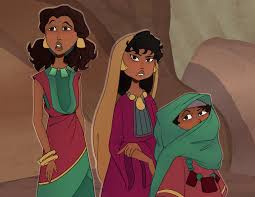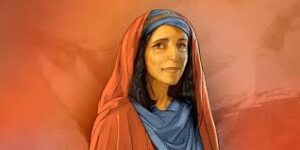Now a Priest in Midian had Seven Daughters
2: 16-22
Now a priest in Midian had seven daughters DIG: How is the exodus foreshadowed in the deliverance of Reuel’s daughters? What other important men and women in the Bible meeting at a well? How did Moshe’s act of driving the shepherds away serve as a microcosm of the later exodus deliverance?
REFLECT: Have you ever dropped out and sat on the spiritual sidelines for an extended period of time? How did this better prepare you for your future? How has ADONAI used you because of it?
Moses fled to the land of Midian, which for the next forty years was his home. It is the area of the southern Sinai Peninsula, the same area in which Mount Sinai is located. The one in charge of that territory was not a king but a priest. His name is Reuel, which means the friend of God. When we get to 3:1 we are told: Now Moses was tending the flock of Jethro his father-in-law, the priest of Midian, and some have seen a contradiction between the two accounts. But Jethro is not a proper name; it is a title like Pharaoh, Kaiser, Cesar or President.
However, Moses did not learn about the God of Abraham, Isaac and Jacob from this man; he learned about Him from his parents until the age of five. At this point Reuel is a polytheist, and is not convinced of monotheism until we get to 18:9-12.

Now a priest of Midian had seven daughters, and they came to draw water and fill the troughs to water their father’s flock (2:16). Women watering animals was very common in the TaNaKh (Genesis 24:11-19). Here is another biblical example of a guy meeting the right girl by a well. Isaac’s servant, Eliezer of Damascus, found Rebekah by a well (Genesis 24:15-16). Where did Rebekah finally meet Isaac? At Beer Lahai Roi, or the well of the Living One (Genesis 24:62). Jacob also met Rachel by a well (Genesis 29:1-14). And of course, Jesus talked with a Samaritan woman by a well (John 4:126).
Some shepherds came along and drove them away, but Moses got up and came to their rescue and watered their flock (2:17). This act serves as a microcosm of the later exodus deliverance. Here the women are victimized and oppressed by shepherds who drive them away from the water. Moses stands up for the persecuted and rescues them from the oppressors. The word rescue simply means saved or delivered. The same verb is generally used for the deliverance of the Israelites out of Egypt. That day ADONAI saved Isra’el from the hands of the Egyptians (14:30a). The word for drove away is also used later when Moses and Aaron were driven out of Pharaoh’s presence (10:11). The character of Moses is emphasized here. He was brave, loved justice, took the side of the weak and the oppressed. Those traits would serve him well in the later deliverance of the Hebrews.27
When the girls returned to Reuel their father, he asked them: “Why have you returned so early today?” The watering of their father’s flock should have taken much longer. They answered and said: An Egyptian rescued us from the shepherds. At this point Moses probably dressed, talked and was clean-shaven like an Egyptian. The girls concluded by saying: He even drew water for us and watered the flock (2:18-19).
“And where is he?” he asked his daughters. “Why did you leave him? Invite him to have something to eat.” A man with seven daughters was anxious to find out who this guy was! During the course of the meal, an agreement was made and he would live with them from that point on. Moses agreed to stay with the man (2:20-21a). So ADONAI was working behind the scenes and this stranger was accepted into Reuel’s family.

Later, Reuel would give his daughter Zipporah, which means ladybird, to Moses in marriage. Normally the marriage proposal came from the family of the bridegroom. But occasionally, under unusual circumstances like this, the custom was reversed. The father, of course, had the authority to make such decisions, with their society being totally patriarchal in nature. Later, Zipporah gave birth to their first son, and Moses named him Gershom, a pun which means an alien there or banishment, and refers to Moses’ realization that he, at first somewhat homesick and lonely, was an alien in a foreign land (2:21b-22). He was a man in exile from his home country and the people of his birth. Moses was an alien, as were his Israelite countrymen in Egypt and he was finally experiencing their plight. His son’s name was a constant reminder of his banishment.28
Two general points of application need to be made here for those who follow Christ. First, believers are called to understand and take to heart, the truth that God’s plan for the universe and eternity will come to pass despite sin. Do we think that in some way our sin will thwart ADONAI’s decrees from operating in the world? Not even Satan, at his most wicked and hateful moment, can hinder the providence of YHVH. Even the very gates of hell are powerless to block God’s purposes for the universe. May we hold to that truth.
Secondly, may we grasp the truth that the LORD will use us, like He did Moses, despite our sin. That, of course, does not give us a license to sin, but God employs frail and weak vessels to proclaim the gospel to a dying world. Yeshua uses redeemed sinners to proclaim the excellences of Him who has called us out of the darkness! ADONAI uses His people, despite their weakness, failure and sinfulness, for His glory and His purposes.29



Leave A Comment